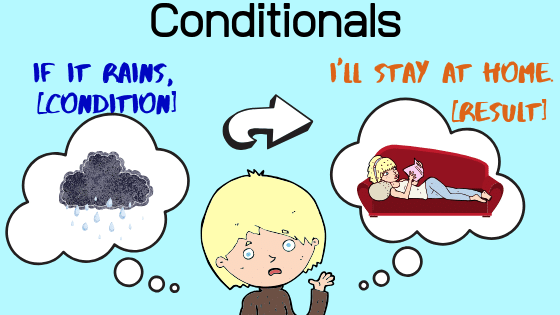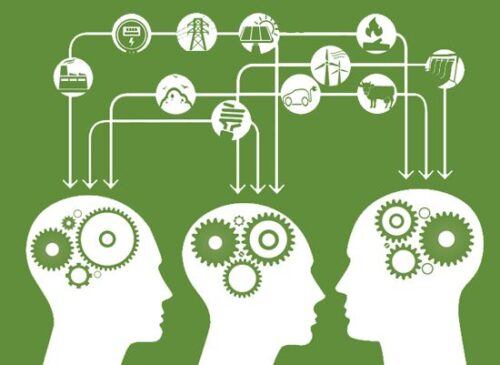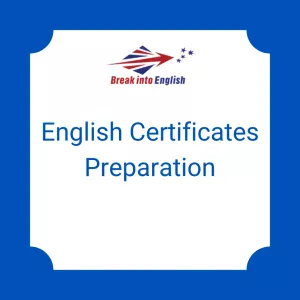Using the zero and first conditional structures correctly is important for beginner level learners and more experienced English students. The grammatical structures are easy to learn and simple to remember with our examples and pictures in this post. You can see some examples in the B1 level reading post: Music and adjectives of personality Have fun reading!
Zero and First conditional structures talk about a result that is dependant on a condition. The sentences, therefore, have two parts, or clauses. In English, we use the word “if” to determine the condition in the first clause, and the result (which depends on the condition) in the other clause.
If ice-cream gets warm, it melts.
[condition], [result]
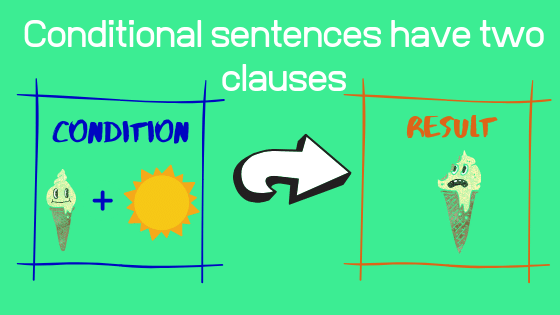
Since the tenses used are unique to each conditional type we can often rearrange the two parts of the sentence freely:
If ice-cream gets warm, it melts.
Ice-cream melts if it gets warm.
Types of conditional structures
There are different types of conditionals, namely zero conditionals, first conditionals, second conditionals and third conditionals. We use these structures depending on how probable the condition and its result are. They can go from 100% certain, if the condition is true the result always happens, to completely impossible (the result was maybe possible in the past but can’t happen at all now). See the table below for a rough guide.
| Type | Tenses in the two clauses | Probability condition will happen |
| Zero conditional | [If + present] + [present] | 100% – will always happen. |
| 1st conditional | [If + present] + [will] | 50%-90%- will probably happen. |
| 2nd conditional | [If + past simple] + [would + infinitive] | 1%-40%- can happen, but probably won’t. |
| 3rd conditional | [If + past perfect] + [would have + past participle] | 0%- impossible, can’t happen because in the past. |
In this article we will focus on zero and first conditional structures. These conditionals mainly use present and future tenses and are either 100% certain or quite likely to happen. You can find information on tenses and other grammar structures in our grammar index.
How to make zero conditional sentences
To form the zero conditional structure formed we use the present tense in both the condition and result part of the sentence. As mentioned before, these parts can be arranged with either the condition coming first and the result second, or the result coming first and the condition second:
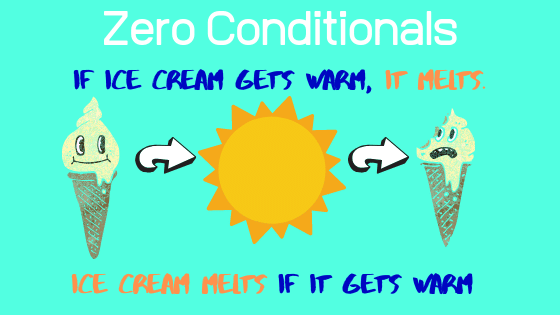
Using “When” instead of “If” in zero conditionals
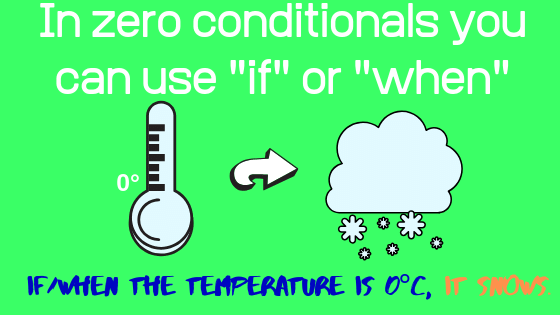
Since zero conditionals describe general truths, things that happen all the time, you can also use “when” instead of “If” in the condition part of the sentence, with the meaning remaining the same. For example :
If the temperature is 0°C, it snows.
[condition] [result]
Has the same meaning as:
When the temperature is 0°C, it snows.
[condition] [result]
Using adverbs of frequency to modify the certainty of the result
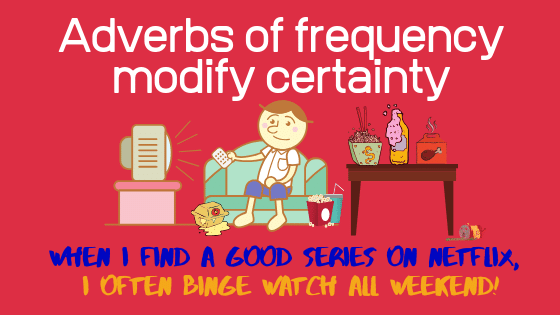
Zero conditional structures are used to talk about results that happen depending on the conditional or “if” clause. Sometimes we need to change the certainty of the second action with an adverb of frequency.
Here are some examples:
If it rains, I always take an umbrella
When the sun shines in Spain, the weather is usually hot.
I never take the train if the busses are running on time.
When I find a good series on Netflix, I often binge watch all weekend!
The 1st conditional
Next, let’s move onto the 1st conditional, here there is probability and chance at play, the result is no longer 100% certain. We use the 1st conditional when we believe the condition and result can (and probably will) happen in reality, but they are not 100% certain like the zero conditional above. It is formed by using the present tense in the condition part of the sentence and most often the future tense with “will” in the result part of the sentence:
If + present tense, (comma) + future with “will”
[condition] [result]
OR
future with “will” (no comma) + if + present tense
[result] [condition]
Using “ -‘ll” for “will” in the 1st conditional
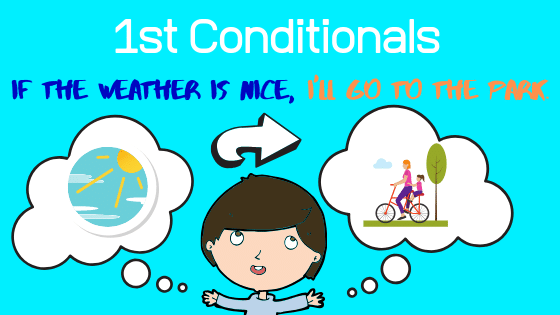
The abbreviated form of “will”, ”(apostrophe) +ll” is used more often than the full word in conditional sentences, as usually, we are describing spontaneous decisions that we might make in the future.
For example:
If the weather is nice, I’ll go to the park.
[condition] [result]
I’ll go to the park if the weather is nice.
[result] [condition]
We use “will not” or “won’t” for negative results

The condition and the result clauses can be affirmative or negative.
For example:
If the company wins the contract, they will give me a bonus.
[affirmative condition] [affirmative result]
If the company doesn’t make a profit, they won’t give me a bonus
[negative result] [negative condition]
Using the 1st conditional for warnings.
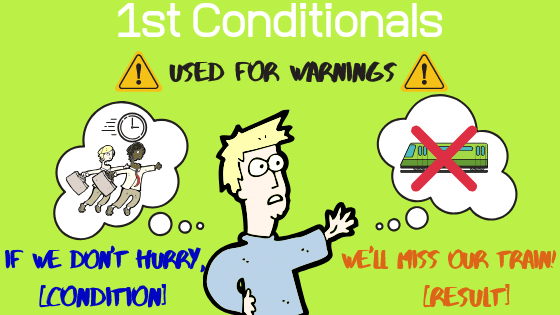
The 1st conditional is also used to warn others of the probable results of certain actions, we often hear these types of warnings between parents and children or teachers and students etc. For example:
If we don’t hurry, we’ll miss our train.
[condition] [result]
OR
We’ll miss our train if we don’t hurry.
[result] [condition]
What’s your English level?
Find out by completing one of our level tests!
What’s your English level?
Find out by completing one of our level tests!
Using other modal verbs instead of “will” in the 1st conditional
We can also use modals like “can,” “may / might,” “must,” and “should,” as well as imperatives (verbs giving instructions) in the result part of the sentence instead of “will”. Modal verbs change the certainty of the result.
For example:
If the children finish their homework, they can play outside. OR The children can play outside if they finish their homework.
If you buy a lottery ticket you might win. OR You might win if you buy a lottery ticket.
If she orders the present now, it should arrive before his birthday. OR The present should arrive before his birthday if she orders it now.
If you ride a motorbike, you must wear a helmet. OR You must wear a helmet if you ride a motorbike.
If you don’t know what to do, ask me. OR Ask me if you don’t know what to do.
Summary of zero and first conditional structures
In summary, zero conditionals happen 100% of the time and 1st conditionals can happen and are usually very likely to happen. Compare the difference in meaning in the examples below:
If the temperature drops to zero degrees, it snows (in general).
When using the zero conditional, the sentence describes what is generally known to be true all the time, for instance, scientific rules.
If the temperature drops to zero degrees, it will snow (here).
When using the 1st conditional, the sentence describes something that can really happen in the future of the current situation. There are good chances it can snow in the speaker’s home town or city, but it still might not.
Zero and first conditional structures in songs
Conditionals are used all around us, especially in music, here are some songs that use some of the conditional structures we have seen above, but there are many many more, can you think of any songs you like that also use “if” conditionals?
Rupert Holmes – The Pina Colada Song
Spice Girls – Wannabe
Death Cab For Cutie – I Will Follow You Into The Dark

This article was written by Break Into English’s blog contributor Ilaria Marazzina.

